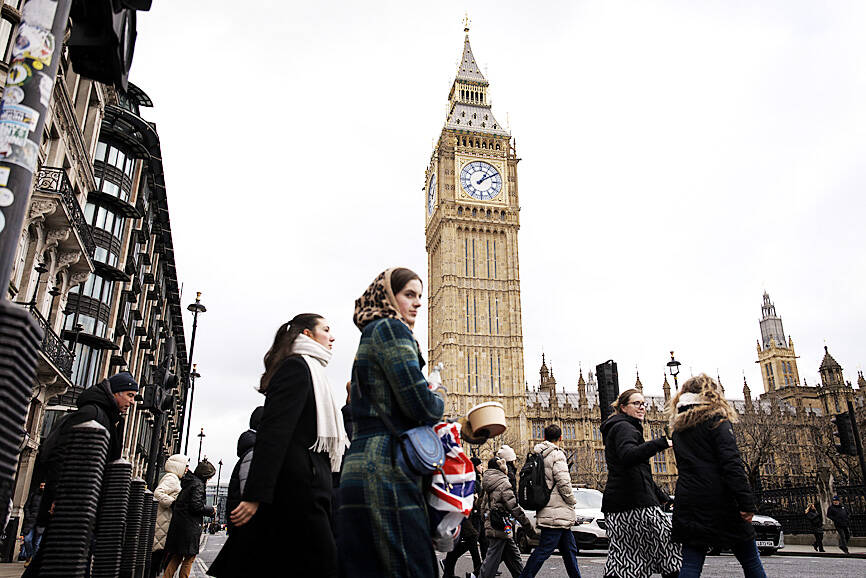UK businesses have run down a mountain of cash reserves built up during the COVID-19 pandemic, leaving them more likely to cut jobs when the Labour Party’s tax hikes come into effect in April.
Firms added more than £150 billion (US$187.19 billion) to their savings when the economy was placed under COVID-19 restrictions, thanks to a mix of loans and large-scale public-sector support.
Corporate coffers reached almost double the value of their quarterly wage bills, a Bloomberg analysis of official data showed.

Photo: EPA-EFE
However, most of those excess reserves are now gone. Firms tapped into them during the cost-of-living crisis to keep up with inflation-busting pay rises, including double-digit increases in the minimum wage, and high borrowing costs.
The ratio of savings to payroll bills is now back to its pre-COVID-19 level of just above 1.5.
“It’s the corporate equivalent of households’ excess savings being eroded by high inflation last year,” EY ITEM Club chief economic adviser Matt Swannell said. “With some reserves, it’s easier to keep hold of staff even if they are expensive. In real terms though, if your savings have depleted, that becomes harder to do.”
Businesses complained vociferously after British Chancellor of the Exchequer Rachel Reeves increased a payroll tax by about £26 billion a year in her Oct. 30 budget. Reeves has insisted the tax rise would go ahead in April, blaming the previous Conservative government for leaving a £22 billion hole in the public finances.
Firms have already started to reduce headcount, as they brace not only for the hike in national insurance contributions, but also a third consecutive increase in the minimum wage that also takes effect in April.
The pace of job-cutting in January and December was the fastest since the wake of the 2008 global financial crisis, barring the COVID-19 pandemic, a purchasing-management survey published by S&P Global on Friday showed.
Supermarket giant J Sainsbury PLC a day earlier announced 3,000 roles are to go — including a 20 percent reduction in senior management — and that all of its remaining in-store cafes are to close.
HM Revenue & Customs data through last month showed that private-sector employers have shed more than 150,000 employees since Labour took office in July last year, including 70,000 since the budget. Workers in hospitality, retail and manufacturing have borne the brunt.
The run of bad economic headlines piles pressure on the Bank of England to cut interest rates further, with the post-COVID-19 trend of “hoarding” staff in the face of weak demand now apparently over.
Its newest rate-setter, Alan Taylor, recently warned of a “hard landing” and recession if officials act too slowly.
“There is scope for increased unemployment going forward,” Swannell said.

Nvidia Corp CEO Jensen Huang (黃仁勳) today announced that his company has selected "Beitou Shilin" in Taipei for its new Taiwan office, called Nvidia Constellation, putting an end to months of speculation. Industry sources have said that the tech giant has been eyeing the Beitou Shilin Science Park as the site of its new overseas headquarters, and speculated that the new headquarters would be built on two plots of land designated as "T17" and "T18," which span 3.89 hectares in the park. "I think it's time for us to reveal one of the largest products we've ever built," Huang said near the

China yesterday announced anti-dumping duties as high as 74.9 percent on imports of polyoxymethylene (POM) copolymers, a type of engineering plastic, from Taiwan, the US, the EU and Japan. The Chinese Ministry of Commerce’s findings conclude a probe launched in May last year, shortly after the US sharply increased tariffs on Chinese electric vehicles, computer chips and other imports. POM copolymers can partially replace metals such as copper and zinc, and have various applications, including in auto parts, electronics and medical equipment, the Chinese ministry has said. In January, it said initial investigations had determined that dumping was taking place, and implemented preliminary

Intel Corp yesterday reinforced its determination to strengthen its partnerships with Taiwan’s ecosystem partners including original-electronic-manufacturing (OEM) companies such as Hon Hai Precision Industry Co (鴻海精密) and chipmaker United Microelectronics Corp (UMC, 聯電). “Tonight marks a new beginning. We renew our new partnership with Taiwan ecosystem,” Intel new chief executive officer Tan Lip-bu (陳立武) said at a dinner with representatives from the company’s local partners, celebrating the 40th anniversary of the US chip giant’s presence in Taiwan. Tan took the reins at Intel six weeks ago aiming to reform the chipmaker and revive its past glory. This is the first time Tan

CUSTOMERS’ BURDEN: TSMC already has operations in the US and is a foundry, so any tariff increase would mostly affect US customers, not the company, the minister said Taiwanese manufacturers are “not afraid” of US tariffs, but are concerned about being affected more heavily than regional economic competitors Japan and South Korea, Minister of Economic Affairs J.W. Kuo (郭智輝) said. “Taiwan has many advantages that other countries do not have, the most notable of which is its semiconductor ecosystem,” Kuo said. The US “must rely on Taiwan” to boost its microchip manufacturing capacities, Kuo said in an interview ahead of his one-year anniversary in office tomorrow. Taiwan has submitted a position paper under Section 232 of the US Trade Expansion Act to explain the “complementary relationship” between Taiwan and the US